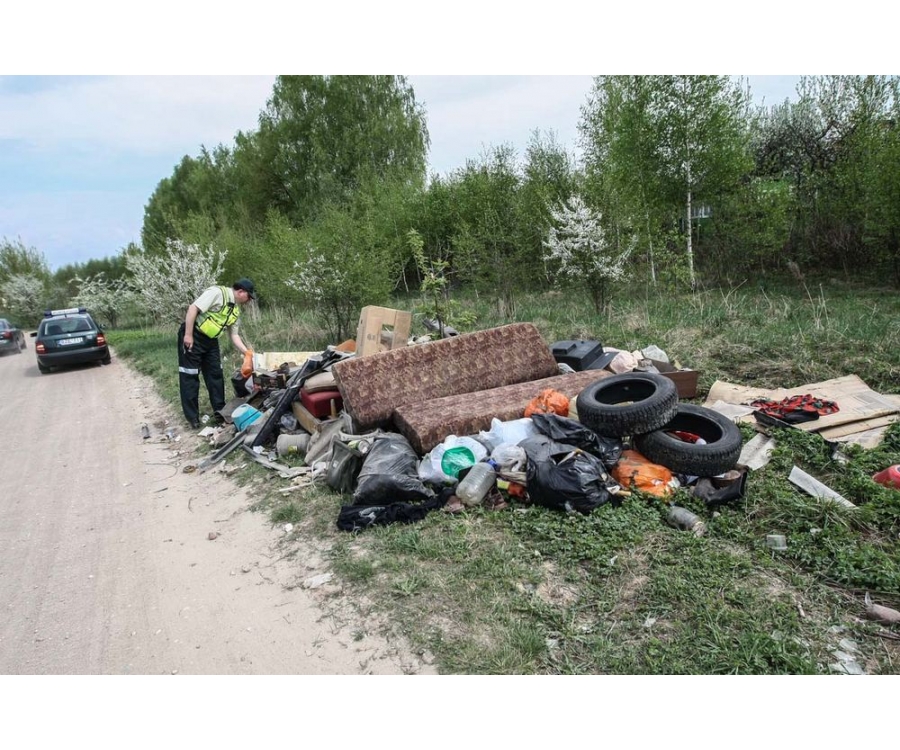How to dispose of hazardous car waste correctly?

This time we would like to tell those who do not know and remind those who know that most car waste is listed as hazardous waste:
- Oil, its packaging and cloths lubricated with it;
- Batteries;
- Hydraulic shock absorbers;
- Oil, fuel and air filters;
- Batteries and other car parts containing dangerous substances.
Such waste, as well as automotive waste that is not considered hazardous waste (such as car tires), is discarded anywhere, unsorted or improperly handled can pose a significant risk to both the environment and human health.
Automotive oil shock absorbers, fuel and oil filters consist of metal and oil or fuel residue. According to public health experts, naturally emitted car parts containing oil can contaminate large areas and turn them into almost wastelands. Improper handling of old batteries during the breakdown process or damage to the battery case releases many hazardous chemicals into the environment: heavy metals and electrolyte. Lead, like all heavy metals, does not cause acute poisoning if it enters the body. This metal builds up in the body and over time lead can lead to nervous system disorders, insomnia, headaches, increased nervousness. Worn tires lying in the woods, ditches or on the river bank not only darken the image but can also cause a fire. A tire is a petroleum product that releases harmful substances when it burns into the environment. Batteries disposed of in landfills together with household waste begin to decompose and release heavy metals such as nickel, cadmium, zinc, lead, etc., most of which are carcinogenic.
How to handle hazardous waste correctly?
Used oil:
Forbidden:
- Mix with other wastes or materials.
- Burn without special permits. Used oil can only be burned in dedicated furnaces with special filters and at high temperatures.
- Drain or discharge oil waste into surface and groundwater bodies and drainage and sewerage systems, on the soil.
- Transfer waste oil to persons who are not entitled to dispose of such waste.
Where to give away?
- Residents may dispose of the waste oil generated to a waste manager who is entitled to dispose of such waste.
- Residents may leave waste oil in companies providing vehicle maintenance and repair services, provided that the person uses the services of these companies to operate their vehicle.
Batteries, shock absorbers, fuel, air, oil filters:
Forbidden:
- Dispose of together with municipal waste
- Arbitrary disassembly
Where to give away?
- Leave to vehicle maintenance and repair companies if the person uses the services of these companies to operate their vehicle.
- Add to large municipal waste collection sites. A detailed list can be found here: http://www.am.lt/VI/index.php#a/7609 Before transporting waste to the nearest site, it should be clarified which waste it accepts, as different sites accept different waste.
- Transfer to authorized waste managers
Batteries:
Forbidden:
- Dispose of together with municipal waste
Where to give away?
- Disposable batteries and accumulators must be disposed of in special collection containers designed to ensure that used batteries are not endangered by the environment or public health.
Tires:
Forbidden:
- Dispose of together with municipal waste
- Used tires can be handed over free of charge at a tire distribution point if the waste tires are destined for the same vehicle type and are available for purchase.
Where to give away?
- Add to large municipal waste collection sites. A detailed list can be found here: http://www.am.lt/VI/index.php#a/7609 Before transporting waste to the nearest site, it should be clarified which waste it accepts, as different sites accept different waste.
Most waste can be recycled and returned to the market as new products.
During recycling, the batteries are dismantled, lead plates, plastic housings and electrolyte are separated. New batteries are made from lead and plastic housings, and electrolyte can be used to make fertilizer. Recycling waste oil saves energy. Refining oil requires only a third of the energy that would be used to produce oil from crude oil. High quality base oil can be made from recycled oil. It can also be refined and used as motor oil or recycled into a less environmentally friendly furnace fuel. Spent oil, fuel and air filters: Recycling of fuel and oil filters produces metal and oil, and air filters extract plastics.
r filter material. The oil is recovered or incinerated. Recycled oil can be used for the same purpose or for completely different needs: high-quality base oils can be produced; it can be refined and sold as a motor oil. The refining of waste oil saves valuable energy: the refining of waste oil requires only a third of the energy that would be used to turn crude oil into oil.
Metal production is energy-intensive and emits huge amounts of greenhouse gases, which are the direct culprits of climate change and global warming. Therefore, the recycling of used filter metal not only saves natural resources, pollutes less than producing metal from primary raw materials, but also saves energy. Recycling shock absorbers produces metal, oil and rubber. Rubber is a key component of tires, the properties of which do not change much even after the tires have reached the end of their service life. In view of this, it is appropriate to recycle tires by separating rubber from other components (metal, textiles) and then using it in other products. The resulting rubber granules can be used in the manufacture of asphalt, rubber coatings (eg for children's playgrounds), parking guards and other products.
So no matter what hazardous substances you have to work with, knowing how to handle them correctly can easily save nature and health.
The information is based on information from the Association of Automobile Manufacturers and Importers.
